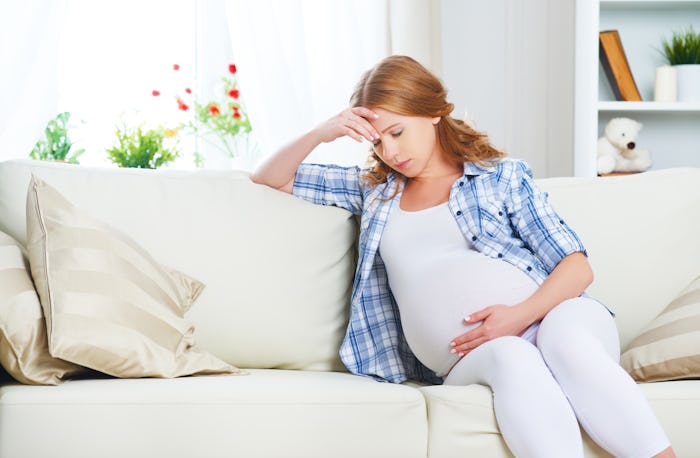Life

Morning Sickness Is Common, But Here's When It's Actually Something To Worry About
From the minute my body registers that it's pregnant, my stomach decides to protest — loudly. I start throwing up during week four or five and stop throwing up at week 40. The term "morning sickness" is a misnomer. In my case it means "hold on to your freaking hat because if you don't, it will fall into the loo as you puke." It's always worried me, but does morning sickness hurt your baby? Because I'm not sure I eat an entire meal in 40 weeks.
Morning sickness, for the most part, is just a huge pain in the butt that everyone hates, according to the March of Dimes. It's enormously inconvenient, it does not just come in the morning, and it doesn't happen to every mom. However, when it becomes severe, as is the case with women who are diagnosed with the condition hyperemesis gravidarum, it can become a concern for mother and child, according to Live Science. The risk lies with a lack of nutrition flowing to mother and baby, and the severe dehydration that can occur when a mother cannot keep food or liquids down. Some women may even have to undergo periods of hospitalization to address their fluid and nutritive needs. For me, it meant not only having to get infusions of nutrition and simple fluids, but also week-long jaunts to the hospital for iron infusion and packed red blood cells. I was basically a vampire when I was pregnant.
The strange thing is that while nausea and vomiting is a normal occurrence during pregnancy for many women, science has yet to discover why it is that this phenomenon exists. There are hypotheses, sure. It's thought that morning sickness is hormonal or related to the alterations occurring in the vestibular system, but researchers have yet to pinpoint the origin. At this point, it's just "Meh. It happens a lot to pregnant women." How blasted unsatisfying is that?
The same goes for hyperemesis, according to the March of Dimes, though they at least have some idea of which women are more likely to suffer from it. If you're pregnant with a girl, if you're overweight, if you have a family history of hyperemesis, or if you suffer from migraines are just some of the risks. I'm unfortunate enough to have ticked several of these boxes.
My mother also had pretty severe morning sickness with all of her pregnancies. She often laments that the only foods she could eat were Hawaiian Punch and chocolate Pop-Tarts. (This explains so much about my baby brother and older sister — not so much me. I'm perfect and the middle child.)
Can morning sickness hurt your baby? Only if it's truly severe, noted the NHS. That means if it comes with an elevated heart rate, if you are getting light headed, if you can't keep anything down, or if you show other signs of dehydration like diminished urination or dry lips and mouth.
Thankfully, science is exploring treatments for women with severe morning sickness to hopefully combat the real risk it poses. According to Live Science, "A study of more than 81,000 women found that those who experienced nausea and vomiting during pregnancy that interfered with their life were 23 percent more likely to deliver their baby before 34 weeks compared with women who said their morning sickness did not substantially affect their lives." Looking at studies like this spurred researchers in the U.K. to find more therapies and treatments for the condition. They looked at vitamin treatments versus common over-the-counter remedies and compared them with medical antiemetics and other medications. The research is nascent, but they're making headway.
While nothing works universally, some women are getting at least a bit of relief, and if you've been there, you know a bit is much better than nothing. If your morning sickness is minor, the study suggested ginger and B6, but definitely ask your provider before taking anything, and try to keep in mind this isn't a permanent condition.
Editor's note: This post has been updated from its original version